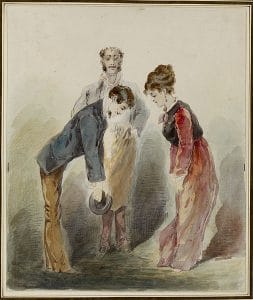As we already know, the Regency Era was very special and demanding. People’s behavior was also influenced by the rules of the Era and there was a code of conduct that affected the attitude and the actions of the individual. These rules were very strict and absolute, and they also defined the relations within the narrow circle of a family.
This specific code of conduct had a bigger impact on women rather than men. A lady’s reputation was based on her behavior but also on her appearance. The classic phrase “Caesar’s wife must be above suspicion” was a basic rule for the ladies of the time.
In my previous article, we talked about the Five Rules of Etiquette a Lady needed to follow, should she wanted to keep her good reputation among her peers.
If you are interested in learning the five rules a lady who lived in England during the Regency Era was obliged to follow, then, my dear, keep reading!
The Regency Era’s code of conduct dictated the behavior of a lady in every possible case. I mean, there were strict rules, even on how a lady should behave during mourning!
Mourning was an act that could not be hidden from society. It was expected from every lady who respected herself to follow the rules of the Era.


The rule of black
It was obligatory for a woman who was mourning to wear black. In fact, there was a specific timetable for the amount of time she would keep the black attire, depending on how close she was to the person who died. For example, if the lady lost her spouse, she had to wear black for twelve months. If she lost her parents, it was six months, and finally, three months if she lost any of her siblings or nephews.
Moreover, we should mention here that she was not only supposed to wear black but the design of the garment was also of particular importance: in no case should the garment draw attention or declared luxury.
Needless to say, a lady who was mourning would never appear at a public event. Even if she had been given a particular invitation, she was expected to refuse. It was perhaps the only case in which it was not rude for a lady to reject an invitation. On the contrary, if she made an appearance at the event, she would create a scandal. When a lady was mourning, society expected that she lived in the shadows.
At a public ball, the master of ceremonies would introduce the gentlemen to the ladies in order for them to be able to dance. A lady couldn’t dance with a gentleman she hadn’t been formally introduced to.
But even after the introductions, there were rules that a lady could not ignore. For example, she could stop dancing only when the music stopped, never before. Or she could not leave the ball before it was over. An action like that would be considered rude and would harm her reputation.


It is important to remember that a lady’s reputation was easy to be tarnished as everyone waited for her to fail. Particularly during balls, a lady had to be careful not to dance many times with the same partner.
All ladies and gentlemen would dance at least one time with each other. A second dance with the same gentleman would mean that he wanted to know the lady better. After the second dance, the lady awaited the gentleman to express his interest to her and to court her. However, the couple could not have a third dance because that meant that the lady and the gentleman had come very close. A third dance could easily stigmatize the reputation of the lady and put her on the blacklist for every future event.
The same as during a ball, there were specific rules during dinner parties as well. The hostess determined the manner in which the ladies would approach the dining room—whether they would enter the dining room alone, according to their social status, or whether each lady would be accompanied by a gentleman whose class matched their own.
It was unacceptable for the lady during the dinner to refuse the soup. As dinner went on, the servants brought new dishes to the table, usually with meat as the main course. The etiquette required that each gentleman should serve the ladies who were sitting next to him but it was not appropriate for him to fill a lady’s dish. Once a lady’s plate was full, she was expected to eat a little bit of everything.
Also, a lady would never ask for wine. She had to wait for a gentleman to serve it, and when this was done, she had to drink in moderation, so as to avoid being characterized as “drinking like a man.”


After dinner the ladies were expected to retire to a separate room, leaving the gentlemen free to enjoy their drinks and conversation. However, even during that case, everyone would have to be careful of how they behaved. It was forbidden for the hostess to praise the dinner they had just enjoyed; in fact, she had to wait for the rest of the ladies to say something. If she did not wait, she would be considered as vain, prominent and only being interested in her image.
One of the main rules of such a tightly-wound society was about touching.
For a lady, even the shaking of the hands of a gentleman could be considered as being overly-familiar. Touching a gentleman was a sign that a lady was interested in him.


A gentleman, though, could put a lady’s shawl over her shoulders, or assist her in mounting a horse or entering a carriage. But, under no circumstances, could they exchange lingering touches or overly-passionate kisses on the hand. This could create a scandal!
Of course, between ladies, the rules were a bit more lenient. For example, sisters were permitted to kiss one another on the cheek! Can you imagine that?!
In big cities in England such as London, a gentleman’s fun included gambling, drinking and getting together with women of ‘ill repute’.
As strange as it sounds, for the ladies of the era it was considered given to pretend they didn’t know about the activities of their husbands. No matter how annoyed they were, they shouldn’t show it.


Of course, the husband always refused the accusation of taking part in activities as such. It was a contradiction in a gentleman’s logic of bringing such a scandal to a lady. At the time it was not important what the husband did, but what his wife knew he was doing!
Moreover, if a spouse had provided her husband with an heir, she could take on a lover. However, it goes without saying that they should be extremely careful and completely discreet, so as not to allow any room for gossip!
Well, this is it!
I would love to know your thoughts on this article!
“For what do we live, but to make sport for our neighbors, and laugh at them in our turn?”
-Mr. Bennet, Pride and Prejudice
Written by Scarlett Osborne



